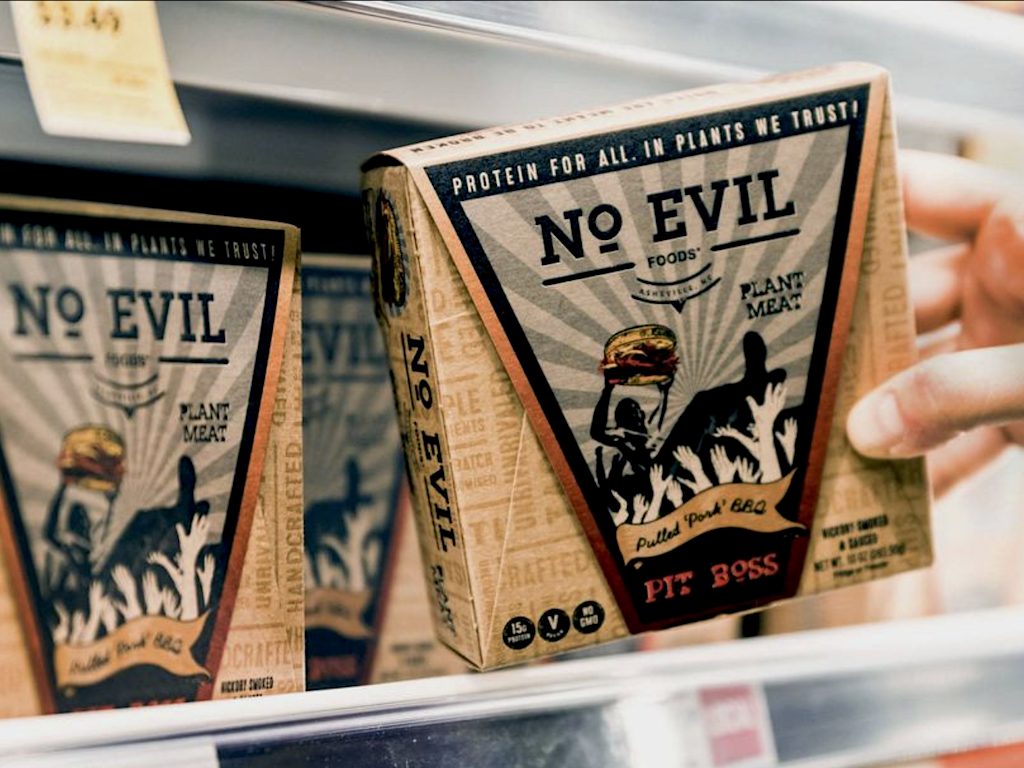3 Mins Read
Announcing their partnership with New York-based plastic credit platform rePurpose Global, vegan meat maker No Evil Foods has just become the first plant-based meat company to take a plastic-negative stance. The Asheville, North Carolina startup will be offsetting their plastic footprint by funding the recovery and recycling of two pounds of plastic waste for every single pound they generate from their packaging materials.
By pledging to remove twice as much plastic waste that it generates, No Evil Foods has become the world’s first plant-based meat brand to become plastic-negative. Through its collaboration with rePurpose Global, a movement that funds the removal of plastic from oceans, the Asheville-based startup will be supporting projects run by CarPe, a civic engagement enterprise focused on waste management and recycling across India. Within one year, No Evil Foods says that its new commitment will help recover more than 8,000 pounds of plastic from the environment.
As a food manufacturer, plastic is a necessity to create safe products, but we can’t ignore our participation in a pressing global plastic-waste problem.
Sadrah Schadel, Co-Founder of No Evil Foods
“Becoming a plastic negative company through rePurpose Global enables us to be directly actionable in our mission to fuel and inspire positive impacts on people, planet, and animals. As a food manufacturer, plastic is a necessity to create safe products, but we can’t ignore our participation in a pressing global plastic-waste problem,” said Sadrah Schadel, co-founder of No Evil Foods.
Scientists have warned plastic pollution is so severe that even if we slashed plastic use by 80%, we would still be left with an astonishing 710 million tonnes of plastic left on the Earth. Some estimates say humans could be eating and breathing as many as 50,000 particles of microplastic each year, with traces detected in everything from ocean spray to rain and sea salt.
In addition to funding the recovery and recycling of plastics, Schadel added that “until viable alternatives exist, we will continue to seek ways to manage the impact of the creation of our products.”
Currently, No Evil Foods’ line of small-batch plant-based meat products, which include vegan chicken, sausage, chorizo and pulled pork made from non-GMO beans, wheat berries and yeast, are packaged in unbleached kraft cartons that are fully compostable and recyclable. In addition, the labelling is printed with plant-based ink and composed with water-soluble adhesives.
Their decision to go plastic negative will undoubtedly resound across their industry, and we’re excited to help them achieve their sustainability goals moving forward.
Svanika Balasubramanian, CEO of rePurpose Global
However, the brand says it soon hopes to take their sustainability efforts further by eliminating the use of plastic in their packaging altogether in the future. For now, Schadel described that making a plastic neutral and negative commitment is “the next best step a company can take.”
“Their decision to go plastic negative will undoubtedly resound across their industry, and we’re excited to help them achieve their sustainability goals moving forward,” said Svanika Balasubramanian, CEO of rePurpose Global.
Other plant-based meat brands have also taken steps to reduce the footprint of their packaging of late. Heura, the Barcelona-based vegan meat company, for instance, recently introduced fully recyclable packaging predominantly made from paper, which will help the company slash plastic use by 80%.
Lead image courtesy of No Evil Foods.




